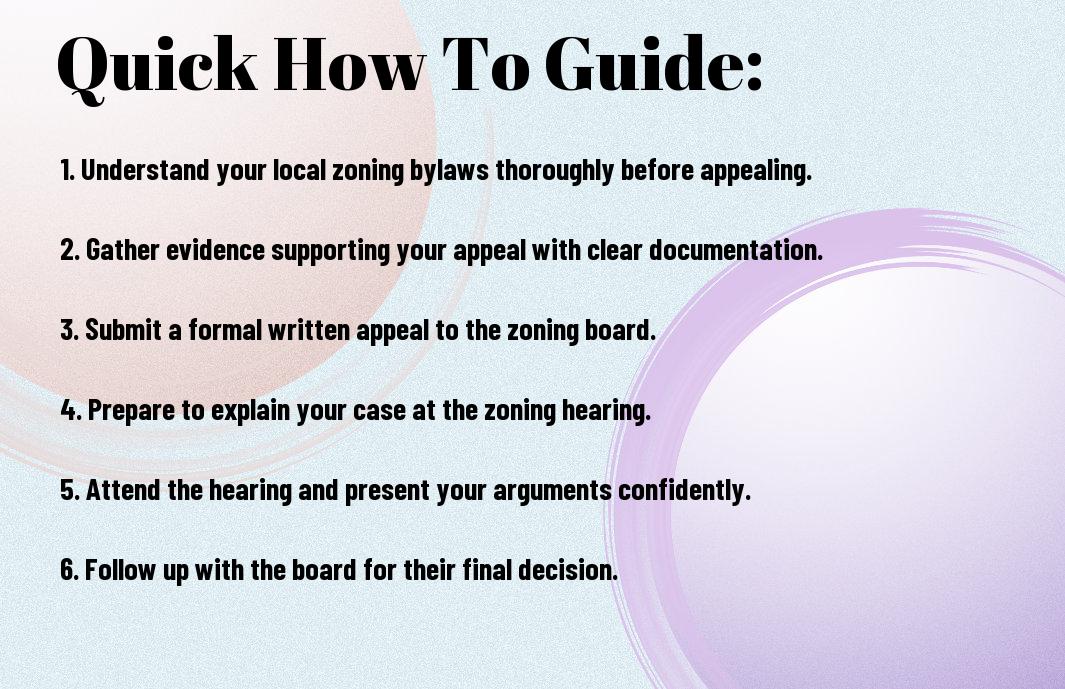Over the course of your property journey, you may encounter zoning laws that restrict your plans for development or renovation. Understanding how to effectively appeal these regulations is important for unlocking your property’s full potential. In this guide, we will take you through the steps involved in appealing local zoning laws in Canada, equipping you with the insights needed to navigate the process confidently. With the right knowledge, you can advocate for your property rights and achieve your desired outcomes.
Key Takeaways:
- Understand the specific zoning by-laws applicable to your property, as they vary significantly across municipalities in Canada.
- Gather and present compelling evidence to support your appeal, including data on community impacts and compliance with provincial and municipal planning policies.
- Engage with local stakeholders, such as community groups and property owners, to build support for your appeal and strengthen your case.
Unpacking the Zoning Appeal Process
The zoning appeal process may seem complex, but understanding its key components can make it more navigable. You initiate your appeal by submitting a formal application to your local planning authority, which will review your case, examine the zoning bylaws, and set a date for a public hearing. The opportunity for community feedback often accompanies this stage. Following the hearing, a decision is rendered, and you typically have the option to appeal that decision further should it not be favorable.
The Legal Framework Governing Zoning Appeals in Canada
Zoning appeals in Canada are guided by provincial legislation and local municipal bylaws. Each province has its own legal framework, often stipulated within the Planning Act or similar statutes. Understanding the specific laws that apply in your jurisdiction is critical, as they spell out the conditions under which you can appeal decisions made by zoning authorities. For example, in Ontario, the Local Planning Appeal Tribunal (LPAT) handles disputes regarding zoning or planning decisions.
Key Terminology Every Applicant Must Know
Familiarity with vital zoning terminology is vital for navigating your appeal successfully. Terms like ‘variance,’ ‘minor variance,’ and ‘permitted use’ often come into play during the appeal process. A ‘variance’ is an alteration to zoning regulations, allowing you to deviate from the set requirements for your property. Understanding these terms equips you to articulate your case effectively and interact constructively with planning officials and the community.
In addition to ‘variance,’ comprehending ‘conditional use’ and ‘rezoning’ can also benefit your appeal. A ‘conditional use’ allows specific operations within a zoning district, while ‘rezoning’ refers to changing the zoning classification of a property entirely. Having a clear grasp of these concepts enables you to position your argument with precision, especially when addressing questions or objections from opposing community members or officials during the hearing process. Knowing the terms also enhances your ability to interpret the documents and communications you receive related to your appeal.
Identifying Grounds for Your Appeal
To effectively challenge a zoning decision, outline clear and compelling grounds for your appeal. Commonly, you may base your argument on inconsistencies with community plans, improper application of zoning laws, or evidence of unfair treatment compared to similar properties. Thoroughly gather and present data that supports your position, whether through expert testimony, historical precedents, or documented community needs that your proposal fulfills.
Common Legal and Practical Reasons for Appeals
Legal grounds for appeal often include procedural errors during the decision-making process, lack of proper notice to affected parties, or violations of statutory requirements. On a practical level, you might argue that the zoning decision adversely affects your property value, limits your rights, or contradicts the municipality’s vision for growth. Each of these factors serves to strengthen your case and warrants careful consideration.
The Role of Community Support and Opposition
Community sentiment plays an instrumental role in the success of your appeal. Engaging with neighbors, local organizations, and advocacy groups can foster support that underscores the merit of your proposal. Conversely, strong opposition from nearby residents can complicate your case, especially if their concerns highlight legitimate issues that resonate with city officials. Building a coalition or gathering petitions may amplify your voice in the appeal process, making it imperative to gauge the community’s stance on your project.
Your appeal will be bolstered by demonstrating robust community backing; this can manifest in petitions, letters of support, or public appearances at zoning meetings. Conversely, if you encounter organized opposition, it’s vital to understand their concerns and prepare your rebuttals. Cultivating positive relationships and initiating dialogue with dissenting voices can enhance your credibility and reflect responsiveness to community interests, thereby positioning you more favorably in the eyes of decision-makers.
Crafting Your Appeal: Essential Components
Effective appeals hinge on several vital components that you’ll need to address. Start by clearly articulating the basis of your appeal, backed by relevant facts, witness statements, and legal precedents. Clarity in your reasoning, alongside a persuasive tone, will guide decision-makers in understanding your position. Additionally, your appeal should demonstrate how the rejection of your application might adversely affect local interests or community benefits, presenting an argument that resonates with zoning authorities.
Building a Compelling Argument: Evidence and Documentation
Your argument gains strength through robust evidence and well-organized documentation. Collect data that substantiates your claims, including demographic studies, maps, photographs, and professional assessments. Expert opinions can further enhance your case, particularly if they provide a community-focused lens. The more concrete the evidence, the more compelling your appeal will be, demonstrating not only the validity of your claims but also community support.
Structuring Your Appeal Document for Maximum Impact
Logical structuring of your appeal document can enhance its overall efficacy. Start with an overview summarizing key points before entering into detailed arguments. Use headings and subheadings for clarity and navigability, and highlight pivotal information such as timelines or significant incidents. Incorporating bullet points can help key details stand out, allowing decision-makers to quickly grasp your vital arguments and supporting evidence. End with a strong conclusion that reiterates your main points and clearly states the desired outcomes.
Prioritizing clarity and organization is vital when structuring your appeal document. Each section should logically flow to the next, guiding the reader through your narrative. Begin with an executive summary that encapsulates your appeal’s essence, followed by clearly defined sections for each point raised. Consider a visually engaging format; using bullets and charts can emphasize key statistics and findings. To maximize retention, ensure your conclusion doesn’t just summarize your appeal but also presents a call to action that encourages thoughtful consideration from the zoning board.
Navigating the Review Process: What to Expect
The zoning appeal review process includes several stages that you need to familiarize yourself with. Expect to deal with a variety of municipal bodies or zoning boards that will review your appeal. The length of this process can vary significantly, from a few months to over a year, depending on your local government’s regulations and workload. For more specifics on your rights regarding zoning changes, consider exploring Handling Zoning Changes: What Are Your Rights?.
Understanding the Review Body and Procedural Steps
Each municipality may have its own designated review body responsible for zoning appeals. Familiarize yourself with their procedures, as they often involve specific guidelines for submitting documents, making presentations, and scheduling hearings. Knowing who is on the review board can also aid in shaping your arguments based on their past rulings and viewpoints.
Preparing for Hearings: Tips for Presenting Effectively
Your presentation during the hearing can significantly influence the outcome of your appeal. Start by organizing your arguments and supporting evidence clearly. Utilize visuals such as maps or images to bolster your case, and rehearse your presentation multiple times to ensure fluidity and confidence. Always anticipate counterarguments and be prepared to address them thoughtfully.
- Know your audience and tailor your presentation to their interests.
- Practice speaking clearly and at a moderate pace to keep listeners engaged.
- Use data and evidence effectively to support your claims.
- Bring printed materials for those attending the hearing.
- Stay calm and composed, regardless of the questions posed.
- Any questions you can’t answer should be acknowledged, and you can offer to follow up later.
Effective preparation involves not just rehearsing your main points but also engaging in potential cross-examinations. Know your zoning laws inside out so you can reference them effortlessly to strengthen your case.
- Anticipate areas of contention and prepare counterarguments.
- Utilize case studies or precedents that support your argument.
- Practice answers to tricky questions with a knowledgeable friend.
- Keep your presentation time manageable to allow for questions.
- Any opportunity you have to connect emotionally with the review body should be utilized to highlight your stake in the process.
Strategies to Enhance Success: Expert Insights
Implementing targeted strategies can greatly increase the likelihood of a successful zoning appeal. Adopting a collaborative approach can foster goodwill and potentially influence outcomes positively. Being proactive in communication and rallying community support can yield significant advantages. Frequently, the most effective appeals emerge when a solid strategy melds with a comprehensive understanding of local dynamics and the particulars of your case.
Engaging with Local Stakeholders and Decision Makers
Building relationships with local stakeholders and decision makers is key to boosting your appeal’s chances. Attend community meetings to introduce yourself, discuss your plans, and address concerns. Cultivating rapport with local officials may sway their perspective, making them more amenable to your proposals. Consider seeking endorsements from neighborhood groups or influential figures, as their support can lend credibility to your case.
Common Pitfalls to Avoid During the Appeal
Several common pitfalls can undermine your zoning appeal. Neglecting to fully understand local regulations, failing to gather adequate evidence, or presenting disorganized materials can significantly weaken your position. Moreover, ignoring community feedback or underestimating the importance of timing may margin your appeal to failure.
Specific missteps frequently occur when individuals present overly emotional arguments rather than data-driven justifications. Successfully navigating the appeals process hinges on understanding the nuances of local zoning laws and regulations. Provide detailed, relevant evidence that supports your case and aligns with community values. Additionally, submitting incomplete or improperly formatted documents can delay proceedings or lead to outright rejection. Engaging professionals, such as urban planners or zoning attorneys, can help you avoid these common pitfalls and enhance the overall strength of your appeal.
To wrap up
The process of appealing local zoning laws in Canada requires a clear understanding of your rights and the specific regulations in your area. By doing thorough research, engaging with local officials, and preparing a well-structured appeal, you can effectively advocate for your needs or interests. Make sure to gather supporting evidence and present your case compellingly. This approach not only enhances your chances of a favorable outcome but also fosters a better understanding of the zoning landscape in your community.
FAQ
Q: What are local zoning laws and why are they important in Canada?
A: Local zoning laws are regulations established by municipalities that dictate how land can be used within specific areas. They serve to manage urban development, ensure compatibility between different types of land uses, and promote public welfare. Understanding zoning laws is crucial for property owners and developers as they define what activities are permissible on a given piece of land, such as residential, commercial, or industrial use. Compliance with these laws is crucial for successful property development and to avoid legal disputes.
Q: What steps should I take if I want to appeal a local zoning decision?
A: If you wish to appeal a local zoning decision, you should first obtain a copy of the zoning bylaw and any relevant documents related to the decision. Next, familiarize yourself with the appeal process outlined by your municipality, which may involve submitting a formal application or letter of appeal within a specific timeframe. Collect evidence to support your case, such as expert opinions, community support, or contrasting examples. It may also be beneficial to consult with a lawyer or a land use planner who specializes in zoning issues, as they can provide valuable guidance through the appeal process.
Q: What are the potential outcomes of a zoning law appeal in Canada?
A: The outcomes of a zoning law appeal can vary based on the specifics of the case. Possible results include the confirmation of the original decision, a reversal of the decision, or a modification of the zoning terms that may allow for adjustments to your intended use of the land. The appeal board or committeewill review the evidence presented and may also consider community feedback before making a decision. It’s vital to prepare a well-structured appeal to enhance the chance of a favorable outcome.







